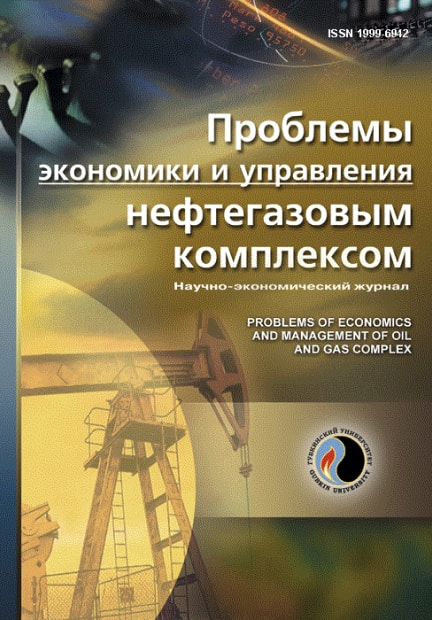Scientific and economic journal
«Problems of economics and management of oil and gas complex»
ISSN 1999-6942

Nuclear power and gas competition in the energy balance of Japan and South Korea: Impact on the LNG market
UDC: 338.012
DOI: 10.33285/1999-6942-2023-6(222)-47-58
Authors:
1 E.M. Primakov National Research Institute of World Economy and International Relations of the Russian Academy of Sciences, Moscow, Russia
Keywords: Japan, Republic of Korea, fuel and energy complex, fuel and energy balance, LNG, nuclear power
Annotation:
Japan and the Republic of Korea are among the most economically developed countries in Northeast Asia and one of the largest consumers and importers of fuel and energy resources in the Asia-Pacific region. Taking into account the minimal reserves and production volumes of their own hydrocarbon fuel and energy resources, trends in demand for imported energy carriers in these countries, in particular LNG, have a significant impact on global energy markets. In addition, nuclear energy has historically been of high importance in the fuel and energy complex of Japan and the Republic of Korea, the development of which began in the late 1960s. After the disaster at the "Fukushima-1" nuclear power plant in 2011, there was a long-term pause in the development of nuclear energy in Japan. However, in 2018–2022, both Japan and the Republic of Korea developed and adopted the updated versions of national documents of state strategic planning in the fuel and energy complex, which assume long-term operation of existing nuclear power plants while reducing the consumption of hydrocarbon fuels in favor of increasing the share of renewable energy sources (RES) in the energy balance. Thus, further intensive growth of LNG consumption in these countries seems unlikely, and the key uncertainty factor is the non-obvious prospects for replacing fuel generation by renewable energy sources and hydrogen energy.
Bibliography:
1. Belogor'ev A. Energeticheskaya politika Yaponii: mezhdu inertsiey i proryvom // Energeticheskaya politika. – 2021. – № 9(163). – S. 24–41. – DOI: 10.46920/2409-5516_2021_9163_242. Kostyukova K.S. "Zelenaya" transformatsiya Yaponii (GX) i initsiativa GX League // Problemy ekonomiki i upravleniya neftegazovym kompleksom. – 2023. – № 3(219). – S. 37–43. – DOI: 10.33285/1999-6942-2023-3(219)-37-43
3. Mastepanov A.M., Arai Kh. Vodorodnaya strategiya Yaponii // Energeticheskaya politika. – 2020. – № 11(153). – S. 62–73. – DOI: 10.46920/2409-5516_2020_11153_62
4. Mastepanov A.M., Sumin A.M., Chigarev B.N. Energeticheskaya politika Yaponii v kontekste energeticheskogo perekhoda i "sanktsionnykh voyn" // Aktual'nye problemy nefti i gaza. – 2022. – № 3(38). – S. 56–84. – DOI: 10.29222/ipng.2078-5712.2022-38.art5
5. Understanding the current energy situation in Japan. – METI, 2019. – URL: https://www.enecho.meti.go.jp/en/category/special/article/energyissue2019_01.html
6. By Kim Byung. 10 years after Fukushima, where does Korea stand on nuclear energy? – The Korea Herald, 2021. – URL: https://www.koreaherald.com/view.php?ud=20210310000941
7. Oda S., Inajima T. Energy-Poor Japan Could Set Up a Liquefied Natural Gas Reserve. – Bloomberg, 2022. – URL: https://www.bloomberg.com/news/articles/2022-12-02/energy-poor-japan-could-set-up-a-liquefied-natural-gas-reserve
8. Green Growth Strategy Through Achieving Carbon Neutrality in 2050. – Ministerial Council on Renewable Energy, Hydrogen and Related Issues of Japan, 2020. – URL: https://www.meti.go.jp/english/press/2020/pdf/1225_001b.pdf
9. IEA World Energy Balances 2022. – IEA, 2022. – URL: https://www.iea.org/data-and-statistics/data-product/world-energy-statistics-and-balances
10. Japan has the world’s most valuable LNG fleet. – LNGPrime, 2022. – URL: https://lngprime.com/asia/vesselsvalue-japan-has-the-worlds-most-valuable-lng-fleet/67780/
11. Japan plans to build new nuclear power plants and restart reactors in 2023. – Enerdata, 2022. – URL: https://www.enerdata.net/publications/daily-energy-news/japan-plans-build-new-nuclear-power-plants-and-restart-reactors-2023.html
12. Japan: Basic Hydrogen Strategy. – Ministerial Council on Renewable Energy, Hydrogen and Related Issues of Japan, 2017. – URL: https://policy.asiapacificenergy.org/node/3698
13. Republic of Korea: Third Energy Master Plan. – Ministry of Trade, Industry and Energy, 2019. – URL: https://policy.asiapacificenergy.org/node/4309
14. Len C., Nian V. Nuclear versus Natural Gas: An Assessment on the Drivers Influencing Japan's Energy Future // Energy Procedia. – 2014. – Vol. 61. – P. 194–197. – DOI: 10.1016/j.egypro.2014.11.1060
15. Convention on Nuclear Safety: National Report of Japan for the Fifth Review Meeting. – Government of Japan, 2010. – URL: http://www.nsr.go.jp/data/000110059.pdf
16. Japan. – Power Reactor Information System, 2023. – URL: https://pris.iaea.org/pris/CountryStatistics/CountryDetails.aspx?current=JP
17. Republic of Korea. – Power Reactor Information System, 2023. – URL: https://pris.iaea.org/PRIS/CountryStatistics/CountryDetails.aspx?current=KR
18. Projected Costs of Generating Electricity: 2020 Edition. – Nuclear Energy Association, 2020. – URL: https://www.oecd-nea.org/jcms/pl_51110/projected-costs-of-generating-electricity-2020-edition
19. The 6th Strategic Energy Plan. – Ministerial Council on Renewable Energy, Hydrogen and Related Issues of Japan, 2021. – URL: https://www.enecho.meti.go.jp/en/category/others/basic_plan/
20. Trade Statistics of Japan. – Ministry of Finance of Japan, 2023. – URL: https://www.customs.go.jp/toukei/info/tsdl_e.htm
21. Trade Statistics of Korea. – Korea Customs Service, 2023. – URL: https://unipass.customs.go.kr/ets/index.do